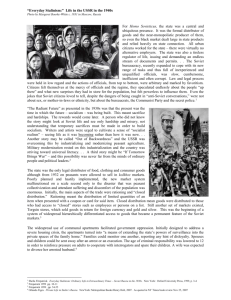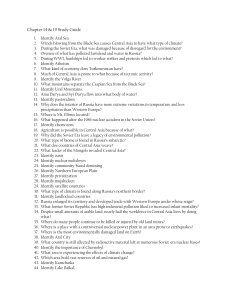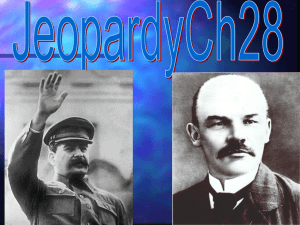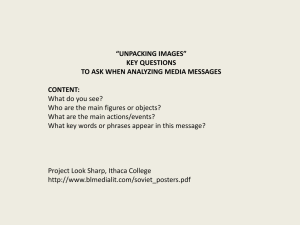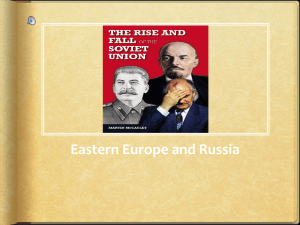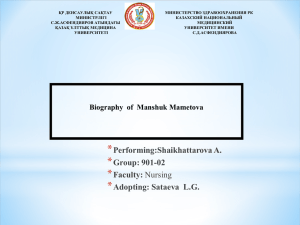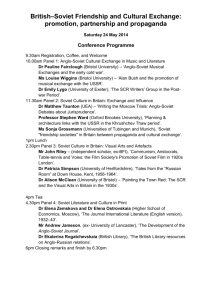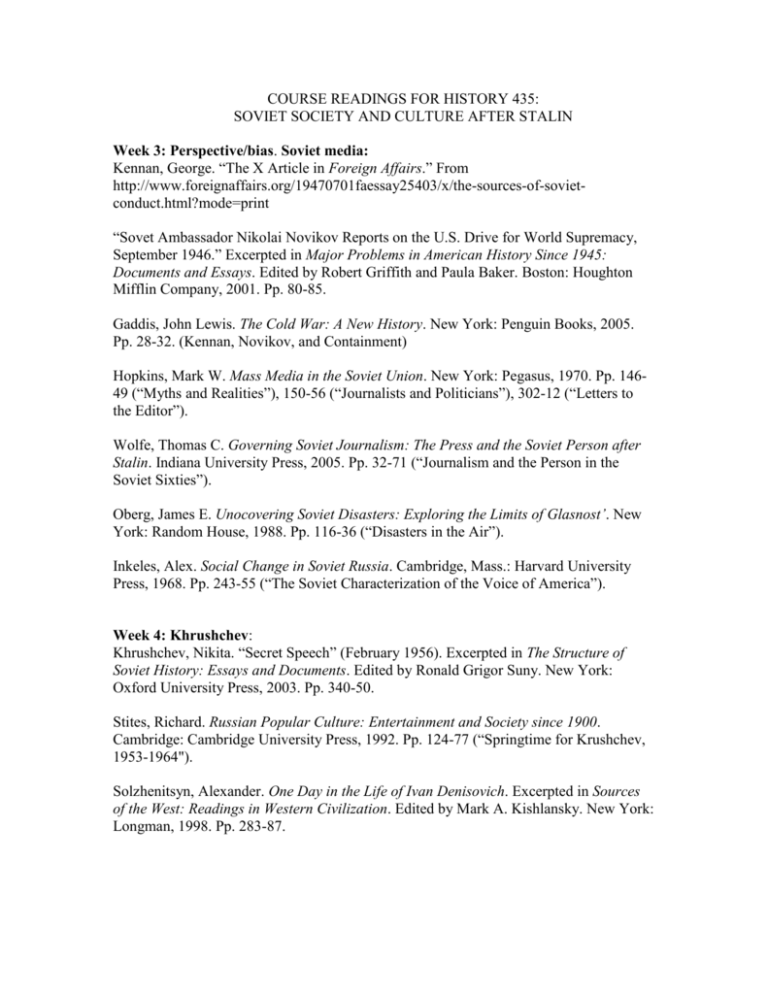
COURSE READINGS FOR HISTORY 435:
SOVIET SOCIETY AND CULTURE AFTER STALIN
Week 3: Perspective/bias. Soviet media:
Kennan, George. “The X Article in Foreign Affairs.” From
http://www.foreignaffairs.org/19470701faessay25403/x/the-sources-of-sovietconduct.html?mode=print
“Sovet Ambassador Nikolai Novikov Reports on the U.S. Drive for World Supremacy,
September 1946.” Excerpted in Major Problems in American History Since 1945:
Documents and Essays. Edited by Robert Griffith and Paula Baker. Boston: Houghton
Mifflin Company, 2001. Pp. 80-85.
Gaddis, John Lewis. The Cold War: A New History. New York: Penguin Books, 2005.
Pp. 28-32. (Kennan, Novikov, and Containment)
Hopkins, Mark W. Mass Media in the Soviet Union. New York: Pegasus, 1970. Pp. 14649 (“Myths and Realities”), 150-56 (“Journalists and Politicians”), 302-12 (“Letters to
the Editor”).
Wolfe, Thomas C. Governing Soviet Journalism: The Press and the Soviet Person after
Stalin. Indiana University Press, 2005. Pp. 32-71 (“Journalism and the Person in the
Soviet Sixties”).
Oberg, James E. Unocovering Soviet Disasters: Exploring the Limits of Glasnost’. New
York: Random House, 1988. Pp. 116-36 (“Disasters in the Air”).
Inkeles, Alex. Social Change in Soviet Russia. Cambridge, Mass.: Harvard University
Press, 1968. Pp. 243-55 (“The Soviet Characterization of the Voice of America”).
Week 4: Khrushchev:
Khrushchev, Nikita. “Secret Speech” (February 1956). Excerpted in The Structure of
Soviet History: Essays and Documents. Edited by Ronald Grigor Suny. New York:
Oxford University Press, 2003. Pp. 340-50.
Stites, Richard. Russian Popular Culture: Entertainment and Society since 1900.
Cambridge: Cambridge University Press, 1992. Pp. 124-77 (“Springtime for Krushchev,
1953-1964").
Solzhenitsyn, Alexander. One Day in the Life of Ivan Denisovich. Excerpted in Sources
of the West: Readings in Western Civilization. Edited by Mark A. Kishlansky. New York:
Longman, 1998. Pp. 283-87.
Johnson, Priscilla, and Leopold Labedz, eds. Krushchev and the Arts: The Politics of
Soviet Culture, 1962-1964. Cambridge, Mass.: The M.I.T. Press, 1965. Pp. 271-88
(“Controversy over Solzhenitsyn”).
Pasternak, Boris. Doctor Zhivago. New York: Pantheon, 1991. Pp. 181-82, 223-24, 227,
234-35, 243-53, 258-59, 296-97, 507.
Week 5: The Brezhnev period:
Millar, James R. “The Little Deal: Brezhnev’s Contribution to Acquisitive Socialism.”
Excerpted in The Structure of Soviet History: Essays and Documents. Edited by Ronald
Grigor Suny. New York: Oxford University Press, 2003. Pp. 370-79.
Vysotskii, Vladimir, letter to Petr Dimichev (1973). In The Structure of Soviet History:
Essays and Documents. Edited by Ronald Grigor Suny. New York: Oxford University
Press, 2003. Pp. 397-99.
New Times, no. 40 (1968); New Times, no. 17 (1979).
McKay, Ron, ed. Letters to Gorbachev: Life in Russia Through the Postbag of
Argumenty i fakty. London: Michael Joseph, 1991. Pp. 7-10, 13-14, 17-19, 25-29, 31-35,
59, 161-63.
Stites, Richard. Russian Popular Culture: Entertainment and Society since 1900.
Cambridge: Cambridge University Press, 1992. Pp. 148-77 (“The Brezhnev Culture
Wars, 1964-1984").
Oberg, James E. Uncovering Soviet Disasters: Exploring the Limits of Glasnost’. New
York: Random House, 1988. Pp. 229-37 (“Nuclear Gulag”)
Week 6: Gorbachev period; photographs and cartoons as historical sources
Political cartoons and photographs:
Daily life
Culture
Politics
Cartoons
Gorbachev, Mikhail. “Perestroika.” In Sources of the Western Tradition. Edited by
Marvin Perry, Joseph R. Peden, and Theodore H. Von Laue. 4th ed. Boston: Houghton
Mifflin Company, 1999. Pp. 432-35.
Andreyeva, Nina. “I Cannot Give Up My Principles.” Excerpted in The Structure of
Soviet History: Essays and Documents. Edited by Ronald Grigor Suny. New York:
Oxford University Press, 2003. Pp. 438-45.
Stites, Richard. Russian Popular Culture: Entertainment and Society since 1900.
Cambridge: Cambridge University Press, 1992. Pp. 178-203 (“Perestroika and the
people’s taste, 1985-“).
Current Digest of the Soviet Press, no. 41 (1986); New Times, No. 3 (1989)
Week 8: Music as history
Starr, Frederick. Red and Hot: The Fate of Jazz in the Soviet Union, 1917-1980. New
York: Oxford University Press, 1983. Pp. 261-315 (“Cooptation and Conflict, 19601967").
Ryback, Timothy W. Rock around the bloc: A history of rock music in Eastern Europe
and the Soviet Union. New York : Oxford University Press, 1990. Pp. 3-7 (Introduction),
149-66 (“The Soviet Rock Scene, 1970-79).
Safonov, Mikhail. ‘You Say You Want a Revolution’. Excerpted in Western Civilization
Volume II. Edited by Robert L. Lembright. Iowa: McGraw-Hill/Dushkin, 2004. Pp. 1724.
Okudzhava biography
Vladimir Vysotskii biography and lyrics
Week 9: Soviet daily life; the end of communism
Smith, Hedrick. The Russians. New York: Ballantine Books, 1976. Pp. 68-105 (“The Art
of Queuing”), 135-65 (“Private Life”), 320-62 (“Nostalgia for a Strong Boss”).
Matthews, Mervyn. Privilege in the Soviety Union: A Study of Elite Life-Styles under
Communism. London: George Allen & Unwin, 1978. Pp. 36-55 (“Special Elite
Benefits”).
Paxson, Margaret. Solovyovo. Washington, D.C.: Woodrow Wilson Center Press, 2005.
Pp. 52-85 (“Being ‘One’s Own’ in Solovyovo”).
Bushnell, John. “The ‘New Soviet Man’ Turns Pessimist.” Excerpted in The Structure of
Soviet History: Essays and Documents. Edited by Ronald Grigor Suny. New York:
Oxford University Press, 2003. Pp. 360-69.
Dallin, Alexander. “Causes of the Collapse of the USSR.” Excerpted in The Structure of
Soviet History: Essays and Documents. Edited by Ronald Grigor Suny. New York:
Oxford University Press, 2003. Pp. 549-64.
Gaddis, John Lewis. The Cold War: A New History. New York: Penguin Books, 2005.
Pp. 195-236. (“Actors”).
Week 10: Film as history and cultural artifact
Viewing of Goodbye, Lenin
Week 11: Women in the USSR
Alexandrova, Ekaterina. “Why Soviet Women Want to Get Married. In Women in Russia.
Edited by Tatiana Mamonova. Translated by Rebecca Park and Catherine A. Fitzpatrick.
Boston: Beacon Press, 1984. Pp. 31-50.
Bridger, Sue. “The Heirs of Pasha: the Rise and fall of the Soviet Woman Tractor
Driver.” In Gender in Russian History and Culture. Edited by Linda Edmondson. New
York: Palgrave, 2001. Pp. 194-211.
McNair, Brian. Glasnost’, Perestroika, and the Soviet Media. London: Routledge, 1991.
Pp. 188-201 (“Women in Soviet news”).
“Marriage and Family Law.” In Exploring Russia’s Past: Narrative, Sources, Images.
Edited by David G. Rowley. Vol. 2. Upper Saddle River, N.J.: Pearson/Prentice Hall,
2006. P. 124.
“Soviet Gender Politics in Central Asia.” In Exploring Russia’s Past: Narrative, Sources,
Images. Edited by David G. Rowley. Vol. 2. Upper Saddle River, N.J.: Pearson/Prentice
Hall, 2006. Pp. 149-51.
Georgii Riazhskii, “The Delegate.” In Exploring Russia’s Past: Narrative, Sources,
Images. Edited by David G. Rowley. Vol. 2. Upper Saddle River, N.J.: Pearson/Prentice
Hall, 2006. P. 153.
“Speech by a Stakhanovite’s Wife.” In Exploring Russia’s Past: Narrative, Sources,
Images. Edited by David G. Rowley. Vol. 2. Upper Saddle River, N.J.: Pearson/Prentice
Hall, 2006. Pp. 172-73.
“Family Law of July 8, 1944.” In Exploring Russia’s Past: Narrative, Sources, Images.
Edited by David G. Rowley. Vol. 2. Upper Saddle River, N.J.: Pearson/Prentice Hall,
2006. Pp. 200-1.
“Homeless Family.” In Exploring Russia’s Past: Narrative, Sources, Images. Edited by
David G. Rowley. Vol. 2. Upper Saddle River, N.J.: Pearson/Prentice Hall, 2006. P. 203.
“‘I Hate Mother’–A Girl’s Letter and Some Replies.” In Exploring Russia’s Past:
Narrative, Sources, Images. Edited by David G. Rowley. Vol. 2. Upper Saddle River,
N.J.: Pearson/Prentice Hall, 2006. Pp. 224-25.
“Forced Marriage in the Northern Caucasus.” In Exploring Russia’s Past: Narrative,
Sources, Images. Edited by David G. Rowley. Vol. 2. Upper Saddle River, N.J.:
Pearson/Prentice Hall, 2006. Pp. 226-27.
“Editorial, ‘Freedom for the Kitchen?” In Exploring Russia’s Past: Narrative, Sources,
Images. Edited by David G. Rowley. Vol. 2. Upper Saddle River, N.J.: Pearson/Prentice
Hall, 2006. Pp. 249-50.
“Single Young Women Workers in Moscow.” In Exploring Russia’s Past: Narrative,
Sources, Images. Edited by David G. Rowley. Vol. 2. Upper Saddle River, N.J.:
Pearson/Prentice Hall, 2006. Pp. 275-76.
“Miss Russia/Miss Universe.” In Exploring Russia’s Past: Narrative, Sources, Images.
Edited by David G. Rowley. Vol. 2. Upper Saddle River, N.J.: Pearson/Prentice Hall,
2006. P. 309.
Week 12: Health, ecology, and leisure
Bucher, Greta. “‘Free, and Worth Every Kopeck’: Soviet Medicine and Women in
Postwar Russia.” In The Human Tradition in Modern Russia. Edited by William B.
Husband. Wilmington, Del.: Scholarly Resources, 2000. Pp. 175-85.
Connor, Walter D. Deviance in Soviet Society: Crime, Delinquency, and Alcoholism.
New York: Columbia University Press, 1972. Pp. 33-50 (“Alcohol Problems”).
Feshback, Muray and Friendly, Alfred Jr. Ecocide in the USSR. New York: BasicBooks,
1992. Pp. 1-11 (“Facing Facts”), 91-103 (“Dark, Satanic Mills”), 181-203 (“Gathering
Ills”).
Week 13: Family, religion, and education
Inkeles, Alex. Social Change in Soviet Russia. Cambridge, Mass.: Harvard University
Press, 1968. Pp. 213–30 (“Family and Church in Post-war Russia”)
Kerblay, Basile. Modern Soviet Society. Translated by Rupert Swyer. New York:
Pantheon Books, 1983. Pp. 110-44 (“The Family”).
Kerblay, Basile. Modern Soviet Society. Pp. 145-69 (“The Educational System”).
Pospielovsky, Dimitry. Soviet Antireligious Campaigns and Persecutions, vol. 2 of A
History of Soviet Atheism in Theory and Practice and the Believer (1988). Pp. 121-51 and
164-87 (persecution under Khrushchev and Brezhnev).
Pospielovsky, Dimitry. Soviet Studies on the Church and the Believer’s Response to
Atheism, vol. 3 of A History of Soviet Atheism in Theory and Practice and the Believer
(1988). Pp. 223-60 (“Believers about Themselves”).

